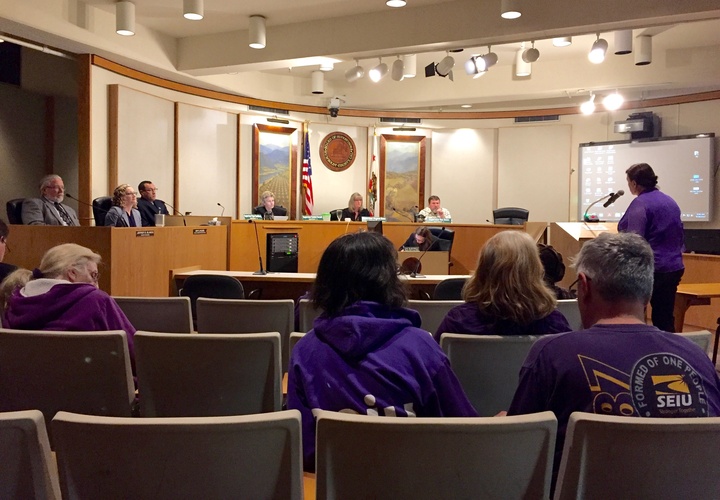
Members of the Service Employees International Union, clad in their trademark purple shirts, gathered to address the Humboldt County Board of Supervisors Tuesday. | Photo: Ryan Burns.
Humboldt County Supervisors’ chambers were nearly full at the start of Tuesday’s board meeting, and for once it had nothing to do with a controversial issue.
Many had shown up in honor of Lisa Dugan, director of the North Coast Regional Department of Child Support Services, who was presented with the first annual Debbie Frahm Leadership Award by the State Department of Child Support Services.
“I’m a little nervous and very humbled,” Dugan said after receiving the award.
Others were there to support of Shelly Beck, who received an honorary proclamation on the eve of her retirement following more than 19 years with the Humboldt County Sheriff’s Office Custodial Services Division.
And a large contingent, recognizable by their trademark purple t-shirts, was made up of members of the Service Employees International Union (SEIU) Local 2015. They were there, as they have been for many months, to advocate for higher wages for In-Home Supportive Services providers.
Vickie Ferguson said she’s been a care provider for the past four years and barely scrapes by on the salary. “Trying to support myself and my family on minimum wage doesn’t work,” she said.
Vivian Deniston, another IHSS worker, said higher wages are needed to make more people willing to do such a difficult job. “I need you guys to give us the respect that we deserve and to get us out of the hole,” she said.
In total eight people got up during the public comment period to advocate for IHSS workers.
Later in the meeting Assistant County Administrative Officer Christopher Shaver, formerly of Mendocino County, made a presentation about the 2017 Community Budget Roadshow, which we wrote about earlier this week.
Shaver started by showing the jaunty little video below, compiled by the county from footage shot by Access Humboldt. It shows each of our county supervisors mixing it up with the public at the collaborative budget meetings that took place around the county this year. Participants were asked to weigh in on spending priorities for Measure S revenue. That’s the countywide marijuana cultivation tax, which is expected to generate $2.2 million in Fiscal Year 2017-18.
First District Supervisor Rex Bohn expressed some skepticism about the results of that process, which showed strong support for mental health services for children and families. Bohn asked if people could repeatedly vote — basically stuff the digital ballot box — on the county’s Open Humboldt online portal. Chief Administrative Officer Amy Nilsen acknowledged that it was possible.
“So it could be five people” voting over and over, Bohn theorized.
After a beat Nilsen said, “Sure!” Her tone was inscrutable.
Fourth District Supervisor Virginia Bass joined Bohn in questioning the weight of the roadshow results. “Are we bound by these numbers?” she asked.
Nilsen assured her that the board is not bound by the survey results. “This is just an informational report,” she said. When it comes time for the board to make budget allocations in June, the roadshow results will be just one of many things to consider.
Second District Supervisor Estelle Fennell, on the other hand, said the roadshow survey results were “very helpful,” and she expressed particular support for the notion of returning resources to the source, meaning sending tax revenues back to the regions of the county from which they’re generated. (Fennell’s own district likely has the most growers in the county.)
Bohn expressed a desire to exert influence on environmental cleanup from destructive marijuana grow ops.
“I’ll beat the drum as long as I can: We need to clean those sites up,” he said. Specifically he suggested either using Measure S revenues or placing liens on properties where code violations have been found — problems such as illegal water diversions, diesel spills, toxic chemicals and garbage dumping.
Nilsen noted that county counsel is planning to bring forward plans for expedited code enforcement actions soon. Bohn approved.
“Let’s hit ‘em where it hurts,” he said.
Moving down the agenda, the board next heard from Connie Beck, director of the Department of Health and Human Services, who provided an update on the county’s emergency winter shelter program.
The county has moved this year to make the program more consistent with the Housing First approach to ending homelessness, Beck said. In previous years the county has issued hotel vouchers for families with minor children and pregnant women, but that system led to many “repeat customers.” Few of the families were finding permanent housing, Beck said.
This year families were required to file for CalWORKS benefits and directed toward “rapid rehousing.” Rather than getting hotel vouchers families received money for move-in costs plus first- and last-month’s rent. The new approach has moved more people into permanent housing while generating a savings of $72,468 from the county’s general fund, an amount that’s likely to grow due to pending notifications, Beck said.
Nilsen suggested using the leftover funds for drug treatment or toward the housing trust fund, though she said such a decision would have to be made at a future meeting.
All that, and the meeting still wrapped up well before lunchtime.
CLICK TO MANAGE